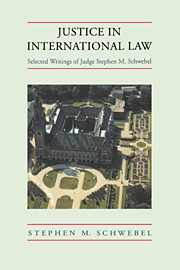Book contents
- Frontmatter
- Contents
- Preface
- PART I International Court of Justice
- PART II International Arbitration
- PART III United Nations
- PART IV International Contracts and Expropriation
- 23 Report of the Committee on Nationalization of Property of the American Branch of the International Law Association
- 24 The Story of the United Nations Declaration on Permanent Sovereignty over Natural Resources
- 25 Speculations on Specific Performance of a Contract between a State and a Foreign National
- 26 On Whether the Breach by a State of a Contract With an Alien is a Breach of International Law
- 27 Some Little-Known Cases on Concessions (with J. Gillis Wetter)
- 28 Commentary on “Social Discipline and the Multinational Enterprise” and “Security of Investment Abroad”
- PART V Aggression under, Compliance with, and Development of International Law
- List of publications
- Index
24 - The Story of the United Nations Declaration on Permanent Sovereignty over Natural Resources
Published online by Cambridge University Press: 06 November 2009
- Frontmatter
- Contents
- Preface
- PART I International Court of Justice
- PART II International Arbitration
- PART III United Nations
- PART IV International Contracts and Expropriation
- 23 Report of the Committee on Nationalization of Property of the American Branch of the International Law Association
- 24 The Story of the United Nations Declaration on Permanent Sovereignty over Natural Resources
- 25 Speculations on Specific Performance of a Contract between a State and a Foreign National
- 26 On Whether the Breach by a State of a Contract With an Alien is a Breach of International Law
- 27 Some Little-Known Cases on Concessions (with J. Gillis Wetter)
- 28 Commentary on “Social Discipline and the Multinational Enterprise” and “Security of Investment Abroad”
- PART V Aggression under, Compliance with, and Development of International Law
- List of publications
- Index
Summary
The United Nations General Assembly adopted at its Seventeenth Session a resolution which, the Delegate of Bulgaria complained, comprised “a charter of foreign investment.” The resolution, entitled “Permanent Sovereignty over Natural Resources,” is the capstone of more than ten years of consideration of the subject by the General Assembly, the Human Rights Commission, the Economic and Social Council and a special Commission on Permanent Sovereignty over Natural Resources. It was adopted by a vote of eighty-seven in favor, two opposed and twelve abstentions. The United States voted with the majority; France and South Africa were the two dissenters; and the Communist bloc (including Cuba) and, for varying reasons, Ghana and Burma, abstained.
The resolution reads:
The General Assembly,
Recalling its resolution 523 (VI) of 12 January 1952 and 626 (VII) of 21 December 1952,
Bearing in mind its resolution 1314 (XIII) of 12 December 1958, by which it established the Commission on Permanent Sovereignty over Natural Resources and instructed it to conduct a full survey of the status of permanent sovereignty over natural wealth and resources as a basic constituent of the right to self-determination, with recommendations, where necessary, for its strengthening, and decided further that, in the conduct of the full survey of the status of the permanent sovereignty of peoples and nations over their natural wealth and resources, due regard should be paid to the rights and duties of States under international law and to the importance of encouraging international cooperation in the economic development of developing countries,
Bearing in mind its resolution 1515 (XV) of 15 December 1960, in which it recommended that the sovereign right of every State to dispose of its wealth and its natural resources should be respected. […]
- Type
- Chapter
- Information
- Justice in International LawSelected Writings, pp. 401 - 415Publisher: Cambridge University PressPrint publication year: 1994



